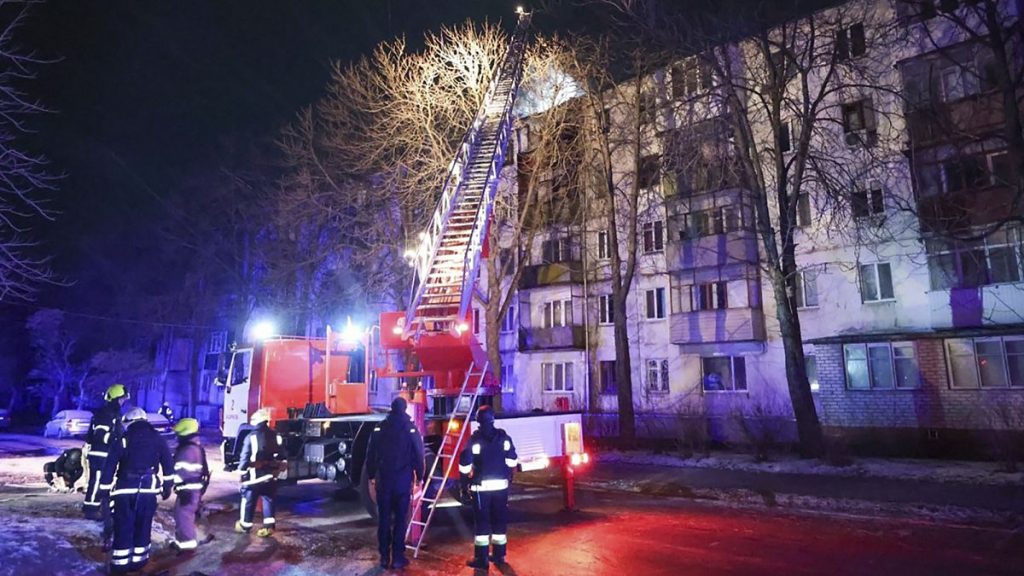Russia’s Relentless Assault on Ukraine’s Energy Infrastructure
The ongoing conflict between Russia and Ukraine has witnessed a disturbing pattern of attacks targeting critical civilian infrastructure, particularly Ukraine’s energy grid. These assaults, characterized by massive barrages of missiles and drones, represent a deliberate strategy by Russia to cripple Ukraine’s power supply and inflict widespread hardship on the civilian population. The goal appears twofold: to demoralize Ukrainians by depriving them of essential services like heating, water, and electricity, especially during the harsh winter months, and to disrupt Ukraine’s defense industry by hindering the production of weapons and military equipment.
Recent attacks, such as the one launched on Friday, illustrate the scale and intensity of this campaign. Russia unleashed a wave of over 90 cruise and ballistic missiles, accompanied by nearly 200 drones, targeting energy facilities across the country. While Ukrainian air defenses managed to intercept a significant number of these projectiles, the sheer volume of the attack still resulted in damage to infrastructure and disruptions in power supply. Cities like Ivano-Frankivsk and Odesa were among those targeted, with the former experiencing what local officials described as the largest attack since the beginning of the full-scale invasion in February 2022. The repeated targeting of Ivano-Frankivsk underscores the strategic importance of the region and the vulnerability of its infrastructure.
These attacks are not isolated incidents but part of a sustained campaign that has inflicted significant damage on Ukraine’s energy system. It is estimated that approximately half of the country’s energy infrastructure has been destroyed or damaged since the start of the war. This has led to widespread rolling blackouts, forcing millions of Ukrainians to endure prolonged periods without power, heating, and access to clean water. The deliberate targeting of civilian infrastructure is a clear violation of international humanitarian law and constitutes a grave war crime.
Ukrainian Resilience and International Support
Despite the devastating impact of these attacks, Ukraine has demonstrated remarkable resilience in the face of adversity. Emergency repair crews work tirelessly to restore power and essential services as quickly as possible, often under extremely challenging conditions. Ukrainian President Volodymyr Zelenskyy has consistently condemned these attacks as acts of terrorism and has appealed to the international community for continued support. He has praised the ongoing assistance from the United States, including a recent $500 million military aid package that includes crucial air defense systems.
The international community has largely condemned Russia’s actions and has provided various forms of assistance to Ukraine, including financial aid, humanitarian supplies, and military equipment. However, some argue that more needs to be done to hold Russia accountable for its war crimes and to provide Ukraine with the necessary resources to defend itself and protect its civilian population. The ongoing attacks on civilian infrastructure highlight the urgent need for increased international pressure on Russia to cease its aggression and respect international law.
The Human Cost of the Energy War
The human cost of Russia’s attacks on Ukraine’s energy infrastructure is immense. Millions of Ukrainians are facing a harsh winter without access to basic necessities like heating and electricity. Hospitals and other essential services are struggling to function, and the cold weather poses a serious threat to vulnerable populations, including the elderly and children. The psychological impact of living under constant threat and enduring prolonged power outages is also significant. Stories of resilience and adaptation emerge from the affected communities, but the situation remains dire and underscores the urgent need for humanitarian assistance.
The Legal and Ethical Implications
The deliberate targeting of civilian infrastructure is a violation of international humanitarian law, specifically the Geneva Conventions, which prohibit attacks on objects indispensable to the survival of the civilian population. These attacks are not only illegal but also deeply immoral, as they inflict unnecessary suffering on innocent civilians. The international community must hold Russia accountable for these violations and ensure that those responsible for these crimes are brought to justice.
The Long-Term Consequences
The destruction of Ukraine’s energy infrastructure will have long-term consequences for the country’s economy and its ability to rebuild after the war. The cost of repairing the damage will be enormous, and the disruptions to essential services will continue to impact the lives of Ukrainians for years to come. The international community must commit to supporting Ukraine in its reconstruction efforts and ensuring that it has the resources to rebuild its energy sector and ensure a sustainable future for its people.
The Need for a Just and Lasting Peace
The ongoing attacks on Ukraine’s energy infrastructure underscore the urgent need for a just and lasting peace in the region. The international community must continue to pressure Russia to end its aggression and engage in meaningful negotiations. A peaceful resolution to the conflict is essential not only for the well-being of the Ukrainian people but also for the stability and security of Europe and the wider world.














